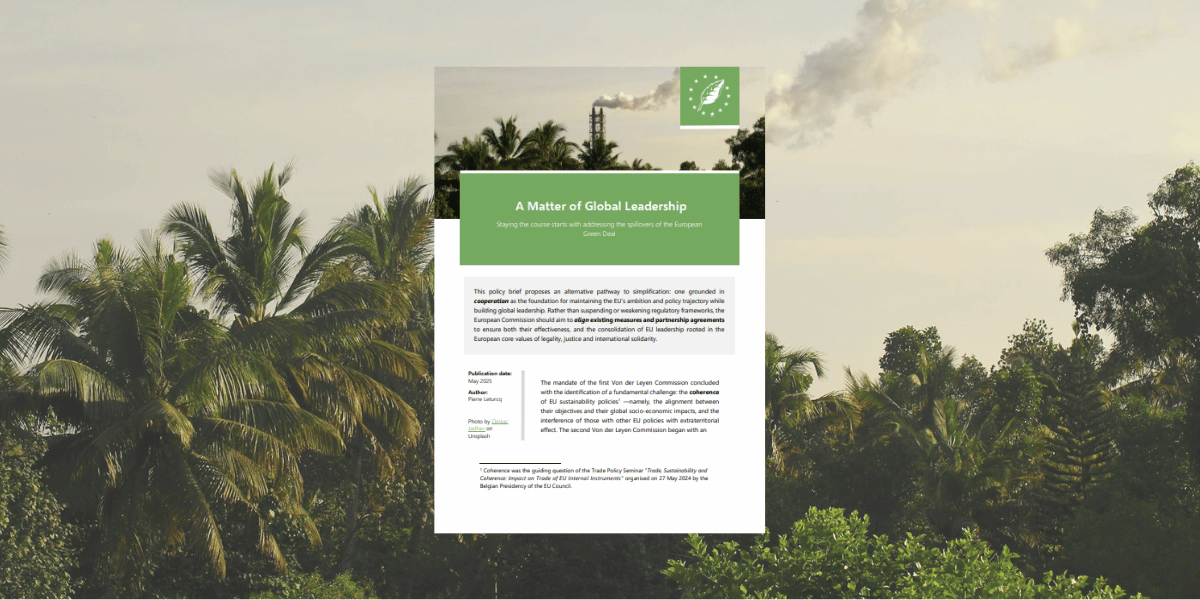AUTHOR: Pierre Leturcq
Cooperation can be the foundation for maintaining the EU’s environmental ambition while building global leadership. Rather than weakening regulatory frameworks, the EU should aim to align existing measures and partnerships to ensure both their effectiveness and European leadership rooted in legality, justice and international solidarity.
The mandate of the first Von der Leyen Commission concluded with the identification of a fundamental challenge: the coherence of EU sustainability policies —namely, the alignment between their objectives and their global socio-economic impacts, and the interference of those with other EU policies with extraterritorial effect. The second Von der Leyen Commission began with an answer: simplification. In many instances, however, this has effectively meant deregulation, here defined as the relaxation, the postponement, or in some cases, the removal of legal obligations related to sustainable development for European economic actors.
This policy brief proposes an alternative pathway to simplification: one grounded in cooperation as the foundation for maintaining the EU’s ambition and policy trajectory while building global leadership. Rather than suspending or weakening regulatory frameworks, the European Commission should aim to align existing measures and partnership agreements to ensure both their effectiveness and the consolidation of EU leadership rooted in the European core values of legality, justice and international solidarity. The European Green Deal (EGD) is an unprecedented policy framework for achieving sustainable growth in Europe. Its ambition goes beyond climate neutrality by 2050 and encompasses biodiversity protection and restoration, the reduction of pollution, and the promotion of a circular economy. As the EU implements this wide-ranging transformation, the Green Deal’s external effects are becoming increasingly visible, from a race to Critical Raw Materials (CRM) to the implementation of unilateral measures with extraterritorial reach.
The brief draws on the outcomes of a Think2030 workshop organised in Warsaw on 28 March, with the support of the Polish Presidency of the Council of the EU. It focuses on the unilateral measures with the most significant impact on countries in the Global South – with a focus on the African continent, and which have resonated most strongly in recent international climate negotiations: the EU Carbon Border Adjustment Mechanism (CBAM), the EU Deforestation Regulation (EUDR) and the Ecodesign for Sustainable Products Regulation (ESPR). The intensity of this debate in international climate negotiations has even led some to refer, in the context of the last UNFCCC COP, to a “CBAM bomb” to debunk. In light of the current climate landscape, characterised by the United States’ withdrawal from the Paris Agreement and a broader context of international mistrust, engaging all willing actors in constructive cooperation is imperative. The imposition by the Trump administration of tariff duties of unprecedented scale in modern history, including on the poorest countries must lead the EU to assume stronger leadership for international legality and solidarity.
This brief advocates for a multidimensional approach involving greater integration of policy objectives across the EU’s domestic and external actions. It calls for enhanced synergies between trade and investment policy, cooperation programmes, and the EU’s international climate strategy, grounded in respect for internationally agreed objectives and commitments enshrined in multilateral environmental agreements (MEA). This reflection piece aims to demonstrate that the time has come to address the international dimension of EU Green Deal legislation more systematically and rigorously. It concludes by posing a number of practical questions that will be explored further in a forthcoming IEEP research report, which will be published in June 2025.
Photo by Omkar Jadhav on Unsplash

